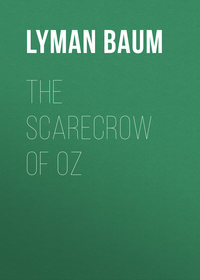 полная версия
полная версияAunt Jane's Nieces on the Ranch
“I think it best to wait until morning before we make any further effort to be heard,” said Mildred. “Our cries would only distract baby and if our screams have not already attracted notice it would be folly to continue them. Anyway, let us try to be brave and patient. Something may happen to save us, before morning.”
Even by the flickering candle-light the place was awesome and uncanny. Inez crept closer to Mildred’s side, quite forgetting her former aversion for her companion. Because the sound of their own voices lent them a certain degree of courage they conversed together in low tones, talking on any subject that occurred to them.
At one time Inez broke an oppressive stillness by saying:
“Tell me about yourself – when you were a girl. And why did you leave here to go to New York?”
Mildred regarded the girl musingly. She felt a strong temptation to speak, to confide in some one.
“Will you keep my secret, Inez?” she asked.
“Yes; of course. I do not tell all I know,” was the reply.
“If you told, it would drive me away from here,” said Mildred.
Inez gave a start, remembering that a few hours ago she would have done anything to drive Mildred away. But, somehow, she had come to regard her companion in misfortune more favorably. A bond of sympathy had been established between them by this terrible experience they were now undergoing. Whatever their fate might be, Inez could not hate Mildred after this.
“I do not wish to drive you away,” she asserted in a positive voice. “I will not tell your secret.”
For a time Mildred mused silently, as if considering how to begin.
“My mother died when I was a baby,” said she. “She was a Travers and lived on a ranch near here.”
“I know the Travers Ranch,” said Inez quickly. “But no Travers have live there in a long time.”
“My mother lived there,” continued Mildred, “until she married my father. Indeed, she lived there several years after, for I was born in the ranch house. But my mother’s people – the Traverses – did not like my father, and when mother died he took me away to a house in Escondido. I think he was sent away, and the family sold the ranch and went back to England, where they had originally come from.
“In Escondido an old Mexican woman kept house for us. She was named Izbel.”
“Ah!” cried Inez, nodding her head wisely; “I know.” Then, as Mildred looked at her questioningly, she added: “Go on.”
“My father was away from home much of the time. He traveled, and sometimes he took me with him into Mexico, and we went as far south as Matanzas, and once to Mexico City. That was when I was quite small, and I do not remember much about it. But often we came here to visit Señor Cristoval, with whom he had some secret business. I have seen him give my father big bags of golden coins, although everyone said he was a miser. I remember that at one time my father hid in this very wall for a day and a night, and officers came to the house and searched it, saying they were looking for a smuggler and had traced him here.
“But Señor Cristoval laughed at them and told them to examine the house thoroughly. This they did, and went away satisfied. Afterward my father came out of the wall and took me across the country to San Bernardino, where we stayed at a friend’s house for several days. Finally Señor Cristoval came there to visit us and I heard him tell my father it would not be safe for him to return home and advised him to go far away. He also gave my father much money, and one curious thing which he said to him I never forgot. ‘I will keep your fortune safely until you need it,’ was his remark. ‘I will hide it where no one will ever find it, any more than they could find you.’”
“Ah! then he hid your father’s fortune in this place?” cried Inez eagerly. Then her face fell. “But, no,” she added. “We have look, and there is no fortune here.”
Mildred sighed and continued her tale.
“After this Señor Cristoval shook my father’s hand, and kissed me – for he was always fond of me – and went away. I never saw him again. My father and I traveled to New York and as I was then eleven years of age I became much troubled over our exile and begged to be told why it was not safe for us to stay in California. He explained to me that he had purchased laces and other goods in Mexico and brought them into the United States secretly, without paying the duty which the robbing government officials imposed. For that he said he was liable to be arrested and put in prison, and if I ever allowed the secret to escape me I would be the means of ruining him. I was a very sensitive child, and the importance of this great secret weighed upon me heavily. My father declared he had done no wrong, but I knew that the officers of the law were constantly searching for him and it so crushed me and destroyed my happiness that at twelve years of age I was as nervous, as suspicious and evasive as any old woman could be.”
She paused and gave a little shudder. Said Inez, who had listened intently:
“I know now who you are. Your name is Mildred Leighton.”
“You know that!” cried Mildred, amazed.
“Of course I know that, when I know your father was the great smuggler that the officers never could catch. I am told many stories about Leighton the smuggler, and old Izbel, who kept his house, is my aunt. Old Izbel say Señor Cristoval give Leighton the money to buy with, and Leighton give Señor Cristoval, who love money so much, half of all he make. But no one could ever prove that. Leighton was very clever man. No one could ever catch him.”
Inez spoke admiringly, as if Mildred’s father was a hero and Mildred had gained added prestige by being his daughter. But the other girl frowned and continued her story.
“In New York,” she said, “we lived in a boarding house and I was sent to school. My father was not kind to me any more. He grew cross and gloomy and often would say if I told his secret he would kill me. I did not tell; I kept the secret safe locked in my heart and suffered agonies of apprehension for his sake, for I still loved him fondly. He now bought a little ship and began to make sea voyages to and from Cuba. He would not let me go with him and he only swore when I tried to get him to give up the wicked and dangerous life he was leading. Often he denounced Cristoval, who had in his possession valuable goods and money belonging to my father but would not give them up because he knew my father dared not go to California to get them.
“For years father continued to smuggle without being suspected. Then one morning I received a note asking me to come to the prison to see him. They had caught him at last and seized his ship, and he said there had been a fight in which several of the government agents had been shot, and one killed. My father did not shoot, he told me, but they would blame him for everything.
“He stayed in the prison for a month, and every day I went to see him. Then came the trial and he was sentenced to prison for life. They – they proved that he ordered his men to shoot,” she added, lowering her head as if ashamed.
“Well, that was right,” maintained Inez, cheerfully. “If they try to arrest him, Leighton was right to shoot.”
“No, Inez, he was very wrong,” replied Mildred sadly. “I would never be allowed to see my father after he was taken away, so they let us talk for the last time. He told me they had taken away all his money and he had nothing to give me, but that if I could manage to get to California old Señor Cristoval owed him much money and – and other things, and perhaps he would give it to me, although he had refused to give it to my father. Afterward they took him away to Sing Sing prison, and that was the last I ever saw of him, for a year later he died.
“I do not suppose, Inez, any girl was ever left with such a heritage of shame and trouble. You think me hard and cold; but can you blame me? Always I think some one will discover my secret, that they will say I am the daughter of Leighton the smuggler and point the finger of shame at me.
“I was a friendless girl with no money. The people at the boarding house would not let me remain and I took my little bundle and wandered out into the street in search of home and employment. It was then that a kind lady, a Mrs. Runyon, had pity on me and put me into a school for nurses. I was fifteen years old and big and strong for my age. At seventeen I was nursing in a charity hospital, but my father’s disgrace had made me an outcast and prevented my obtaining situations with good families. Mrs. Runyon tried to help me but my story was too well known. I changed my name from Leighton to Travers, but even that did not bring me better luck.
“For two years longer I worked for a bare pittance, and then suddenly a ray of sunshine appeared. Miss De Graf came to the hospital where I was caring for an injured child and offered me a position with her cousin out here in California, where I had known the happiest days of my life. More than that, I found to my joy that I was coming directly to the old Cristoval house, for although Señor Cristoval was long since dead – as I had found out by writing him – I remembered the secret rooms and hoped I might find at least a part of my father’s fortune still hidden there.
“Well,” she added after a pause, “these are the rooms, and there is nothing of value left in them; this is the old Cristoval home, where my father was forced to hide from the law; this is the country where the officers hounded the hated smuggler like a dog and finally drove him away. And here is the girl, Inez, who has passed through all these scenes and to-day finds nothing in life worth living for.”
Inez took her hand, shyly but tenderly.
“Meeldred,” she said softly, “perhaps your life will end here. It will be strange, will it not, if that is so? But if we cannot get out, it makes a good story to die in this old den of the smuggler, your father. I will die with you; but I do not mind – much. But Mees Jane – ”
She broke off with a wail of anguish and Mildred said hastily:
“Inez, we must save the baby! And, if we do, we shall also save ourselves. Come; you, at least, have much to live for. You will care for the baby after I have gone far away, and you will be glad, then, that the hated Mildred is out of your life.”
“But I do not hate you any more!” cried the Mexican girl protestingly. “I like you now, Meeldred. We will be friends, an’ we will be happy together, if – if – ”
“If what, Inez?”
“If we live to get out of this wall.”
CHAPTER XVI – AN UNEXPECTED ARRIVAL
As the night advanced the two girls continued to talk, in low and subdued voices because of their anxiety and growing fears. They kept the candles trimmed, for the light lent them courage. They were not hungry, although they had eaten nothing since noon, but they were beginning to suffer from thirst.
The baby wakened with shrill screams and the only way to quiet her was to give her the bottle, which was now less than a third full. Mildred was in a quandary whether to withhold the remainder of the food from little Jane, so as to prolong her life as much as possible, or to allow the baby to eat what she desired, as long as any of the food remained. She finally decided on the latter course, hoping the morning would bring some one to their rescue.
After the little one was again hushed in slumber and cuddled in warm blankets on a seat beside them, the two imprisoned girls renewed their desultory conversation. They realized it must be long after midnight but Mildred avoided looking at her watch because that made the minutes drag so slowly.
Finally a dull sound from the other side of the wall reached their ears. It seemed that some one was pounding upon the adobe. Both girls sprang to their feet in excitement, their heads bent to listen. The pounding was not repeated but a voice was heard – a far-away voice – as of one calling.
Mildred answered the cry, at the top of her lungs, and immediately Inez followed with a shrill scream that roused a thousand echoes in the hidden passage. And now Toodlums joined the chorus, startled from her sleep and terrified by the riot of sound.
They tried to listen, but the baby’s cries prevented anything else from being heard, so they devoted themselves to quieting little Jane. It took some time to do this, for the sobbing infant was thoroughly frightened, but finally Inez succeeded in comforting her and the bottle of precious milk was sacrificed to put baby to sleep again.
By this time the sounds on the other side of the wall had ceased; but the girls were now full of eager hope, believing they had succeeded in letting their friends know they were imprisoned in the wall.
Within the hour more dull pounding began and this continued so regularly that Mildred told Inez the rescuers were surely trying to break through the adobe. They listened alertly to each blow and for a time forgot both thirst and fatigue in the excitement of the moment. Daybreak was near, for already a gray light was creeping in through the gratings overhead.
Suddenly a crash like a thunder-clap resounded from the end of the passage. From the gloomy recess behind the couch a man’s form appeared, struck the bed, was rebounded by the springs into the air, turned a complete somersault and landed on the floor of the passage in a sitting position, facing the two startled nurses.
He did not seem to be hurt, but was evidently bewildered. He glared in amazement at the girls and they glared in amazement at him. Then, slowly, he turned his eyes to view his surroundings and blinked stupidly at the candles, the antique carved furniture, the baby bundled upon a cushioned seat and finally rested his eyes again upon the faces of the nurses.
“Why, it is Señor Bul-Run!” cried Inez, clapping her hands with joy. “He have come to save us.”
“Pardon me,” said the man, in a rather quavering falsetto, “I’m not sure whether I’ve come to save you or to share your peril. Where am I, please?”
“It is the hollow of the wall, sir,” replied Mildred, who had never seen the big fellow before. “It is the secret apartment constructed by Señor Cristoval, who built this house.”
“Well,” said he, slowly getting upon his feet and with another curious glance around, “I can’t say that I consider it a desirable place of residence. Certainly it’s no place for our precious Toodlums,” and he bent over the sleeping babe and tenderly kissed its forehead. Then, straightening up, he said in as determined a tone as his high voice would permit: “We must find a way to get out of here!”
“Can’t you get out the same way you got in?” asked Mildred.
He looked at her in perplexed astonishment.
“How did I get in?” he inquired.
“Don’t you know?”
“I’ve no idea. I was sitting in the window of the blue room, resting, when there was a bang, whirligig, fireworks – and here I am, your uninvited guest.”
“The blue room!” cried Mildred.
“Yes. Did you happen to notice my arrival? I don’t mean its lack of dignity, but the direction I came from?”
“You came from somewhere behind that bed. I saw you strike the mattress and – and bound up again.”
“To be sure. I remember bounding up again. I – I didn’t care to stop, you see. I was anxious to – to – see if baby Jane was all right.”
Mildred could not repress a smile, while Inez giggled openly.
“However,” continued the big man, good-humoredly, “the direction affords us a clew. Pardon my absence for a moment while I investigate.”
He took one of the candles, cautiously made his way over the couch and stood upon the oak chest at the end of the narrow chamber. Here he was able to examine the heavy planking set in the adobe, through which he had doubtless made his appearance but which now appeared as solid and immovable as the wall itself.
Runyon’s first act was to pass the light of the candle carefully over every joint and edge, with the idea of discovering a spring or hinge. But no such thing seemed to exist. Then he took out his big jackknife and began prying. When a blade snapped he opened another, only to break it in his vain twisting and jabbing. Finally he threw the now useless knife from him and began pounding with his fists upon the planking, at the same time shouting with the best voice he could muster. Perhaps the pounding might have been heard had not his friends at that moment been seeking for his mangled form in the garden, among the rose vines.
After listening in vain for a reply, Runyon came back to the girls, saying:
“This is certainly a singular occurrence. I came in as easily as I ever did anything in my life, I assure you; but the way out is not so easy. However, we won’t have to endure this confinement long, for the boys are breaking down the wall in two places.”
Then, in reply to their anxious questioning, he related the incidents of the night: how the discovery was made that Toodlums and her two nurses were missing; of the search throughout the country in automobiles; how the major had heard the “ghost” of baby Jane, which had given them their first intimation of the truth, and of the desperate and vain attempts made to get into the secret chamber.
Mildred, in return, explained the accident that had led to their imprisonment and of their failure to find any means of escape.
“There must be a way out, of course,” she added, “for Señor Cristoval would never invent such clever and complicated ways of getting into this hollow wall without inventing other means of getting out.”
“True enough,” agreed Runyon; “but I can’t see why he thought it necessary to make the means of getting out a secret. These rooms were probably built as hiding-places, and there are at least two separate entrances. But whoever hid here should be master of the situation and have no difficulty in escaping when the danger was over.”
“Unless,” said Mildred, thoughtfully, “the rooms were also intended as a prison.”
“Well, perhaps that is it,” said the man. “Old Cristoval may have thought the occasion would arise when he would like to keep one or more prisoners here, so he concealed the exits as carefully as the entrances. Let us admit, young ladies, that it’s a first-class prison. But,” his tone changing to one of kindly concern, “how have you stood this ordeal? You must be worn out with anxiety, and desperately hungry, too.”
As he gazed into Mildred’s face it occurred to him, for the first time, that Jane’s new nurse was an interesting girl. She was not exactly beautiful, but – attractive. Indeed, at that moment Mildred was at her best, despite the night’s vigil. The hard, defiant look had left her eyes for the first time in years, driven out by a train of exciting events that had led her to forget herself and her rebellion against fate, at least for the time being.
“We are not very hungry,” she said, smiling at the big, boyish rancher, “but we are thirsty. I’d give anything for a good drink of water. And baby is now devouring the last few drops of her prepared food. When it is gone there is nothing here that she can eat.”
“Well,” said he, spurred to action by this report, “I’m going to explore this place carefully, for if we can manage to find a way out it will save Weldon and his men from ruining that wall, and also save time, for the blamed adobe is so hard and thick that it will still require hours for them to make a hole big enough to get us out.”
CHAPTER XVII – THE PRODIGAL SON
With the added light that now came from the gratings in the ceiling every object in the upper room was plainly visible. Runyon began his inspection in a methodical manner, starting at one corner and eyeing the inner wall on every inch of its surface. He tested each block at its corners and edges. The girls watched him listlessly, for they expected no result, having covered the same methods themselves.
At length Runyon was obliged to abandon the wall in despair.
“The opening is there, of course,” he said, “but that confounded Cristoval was too clever for us. If I had the rascal here now, I’d strangle him!”
As he stood in the center of the narrow space, looking around him, his eye fell upon the upholstered seats ranged along one side and he regarded them suspiciously. They were box-like affairs, with the surface of the covers padded and cushioned.
He reached down and lifted one of the lids. As he glanced within he uttered an exclamation of astonishment. The box was almost filled with bottles, lying regularly on their sides.
“Wine!” he cried. “Now, Miss – I don’t remember to have heard your name – I shall be able to relieve your thirst.”
“My name is Travers – Mildred Travers, sir; but I can’t drink wine.”
“Not to quench your thirst – just a few swallows?” he asked, taking a bottle and trying to remove the cork.
“Not a drop, even to save my life,” she replied positively.
“But I will, Señor Runyon – I will!” cried Inez eagerly.
“Runyon!” exclaimed Mildred, stepping back in amazement and looking at the man rather wildly.
“Excuse me; haven’t I introduced myself?” he asked, looking up. “Yes; my name’s Runyon.”
Something in her expression arrested his gaze and he regarded the girl curiously.
“Bulwer Runyon?” she said in a low voice.
He sat down on the box, holding the bottle between his knees.
“They christened me that. Very foolishly, I think. But what do you know of Bulwer Runyon?”
“Your mother – is – Martha Runyon?”
“To be sure – bless her heart! Ah, you know my mother, then, and that’s how you have heard of me. But nothing good, from the dear old lady’s lips, I’ll be bound.”
“She really loves you,” replied Mildred quickly; “only – you have disappointed her.”
“Indeed I have. I’ve always disappointed her, ever since I can remember.”
“You were very extravagant,” said Mildred in a reproachful tone.
“Yes; that was my fault. Father spoiled me; then he died and left all his fortune to mother. Quite right. But mother is pretty close with her money.”
“Did she not pay all your debts?”
“Yes; but that was foolish. She reproached me for owing people, which was one of my pet recreations. So she paid the bills, bought me a ranch out here, shipped me into exile and washed her hands of me, declaring that the ranch was my sole inheritance and I must never expect another cent of her fortune. She proposes, I believe, to invest her surplus in charity. Nice idea, wasn’t it?”
“It was very generous in her,” declared Mildred.
“Was it? Well, that’s a matter of opinion. But I regard her gift of this ranch as the first step to perpetual pauperdom. She tossed the land at me, shuffled me off, and then expected me to make a living.”
“Can’t you do that?” asked Mildred wonderingly.
“Make a living on a California ranch!” he said, as if astonished.
“Others do,” she asserted.
“There is no other just like your humble servant,” he assured her, again struggling with the cork. “I can’t grow enough lemons – it’s a lemon ranch she handed me – to pay expenses. The first year I decorated my estate with a mortgage; had to have an automobile, you know. The second year I put another plaster on to pay the interest of the first mortgage and a few scattering debts. Third year, the third patch; fourth year, the usual thing. Fifth year – that’s this one – the money sharks balked. They said the ranch is loaded to its full capacity. So, I’ll have to sell some lemons.”
“Oh, I’m so sorry!” cried Mildred.
“So am I, thank you. Stupid thing, selling lemons. But the wolf’s at the door and all I can do is shoot lemons at the brute. Lemons! Wasn’t it tart of the dear mother to load me with such an acidulous estate? Perhaps she imagined it would make me assiduous – eh?”
“Your mother hoped you would turn over a new leaf and – and redeem your past,” said the girl.
“Well, it’s too late to do that now. I can’t redeem the past without redeeming the ranch, and that’s impossible,” he declared with a grin. “But tell me, please, how you happen to be so deep in my mother’s confidence.”
Mildred hesitated, but reflected that she really owed him an explanation.
“She protected me when I was in trouble,” she said softly.
“Ah; that’s like the dear old girl. Do you know, I’ve an idea that when I’m down and out she’ll relent and come to my assistance with a fatted calf? It would be just like her. I’ve known of others she befriended. Her hobby is to help poor girls. There was that Leighton girl, for instance, whose smuggling, murderous father was imprisoned for life. The poor little thing hadn’t a friend in the world till mother took her in hand and put her in a training school for nurses. The mother wrote me how interested she was in that case. Her protege did her credit, it seems, for the child turned out a very good nurse, who – who – ”









